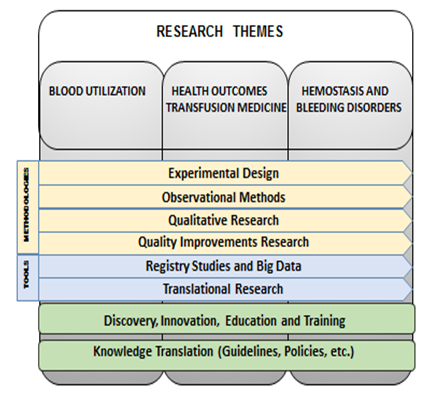Research Overview
Our strategic goal is to provide scientific evidence that will inform best practice within three broad research themes:
- Blood Utilization: the study of evidence-based blood product use, including alternatives, sustainability, and donor research.
- Health Outcomes Research: including large epidemiological studies to understand patterns of blood product utilization, and link donor characteristic, product processing methods and transfusion outcomes.
- Hemostasis and Bleeding Disorders: both inherited and acquired, including basic mechanistic studies in immune cytopenias and clinical studies on specialized blood product utilization.

Research methodologies that are used to achieve our research goals include:
- Experimental clinical trials (e.g. pragmatic randomized trials, and cluster designs)
- Observational studies
- Qualitative techniques
- Quality improvement methods
- Patient-reported outcomes
- Large transfusion databases
Knowledge Mobilization
Our knowledge mobilization strategy includes:
- Publications and presentations
- Partnerships
- Participation in governmental policies
- Participation in international guideline initiatives
- Mentorship
- Social media (Twitter: @MCTransfusionR)
Training
Education and training are key missions of MCTR. Our group is committed to training highly qualified personnel in clinical research methodology, epidemiology, and policy relating to Transfusion Medicine in Canada.
Located within the Department of Medicine at McMaster University, MCTR has formal ties with the Departments of Clinical Epidemiology and Biostatistics and Pathology and Molecular Medicine. MCTR’s inter-departmental collaborations with various Faculties in McMaster University (e.g., Faculties of Science, Health Sciences) and inter-institutional collaborations (e.g. University of Waterloo), provide a rich educational environment for trainees at all levels. McMaster University also provides opportunities for fellowship training in Transfusion Medicine through the Royal College Competency-based Training Program. Trainees will learn health research methodology, approaches to clinical and translational research, and evidence-based practices.
